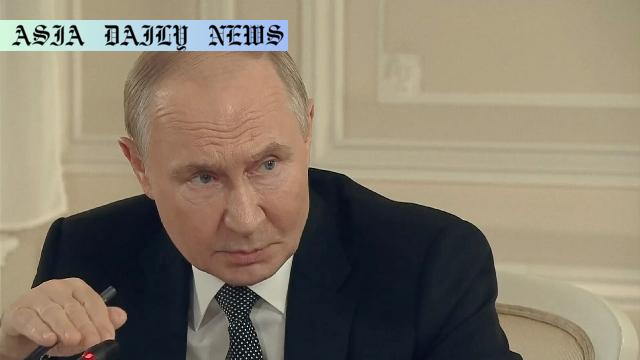Peace Treaty: Russia pressures Ukraine to promptly accept the memorandum on a potential peace treaty following direct negotiations.
Russia is pressuring Ukraine to accept a peace memorandum.
Putin warns that delays could worsen Ukraine’s situation.
The memorandum demands troop withdrawal from annexed areas.
Ukraine rejects Russia’s repeated proposals and conditions.
Russia continues attacks to expand control in eastern Ukraine.

The Escalating Push for a Peace Treaty
Russia’s President Vladimir Putin is exerting pressure on Ukraine to promptly accept a memorandum for a potential peace treaty. Speaking to media representatives in St. Petersburg, Putin emphasized the urgency of the situation, warning that delays in negotiations could lead to adverse consequences for Ukraine. As tensions persist, the demand for a resolution is underscored by the backdrop of ongoing hostilities, especially in Ukraine’s east and south.
During negotiations in Istanbul earlier this year, both nations exchanged memorandums that outlined terms for peace. Russia’s core demands include the withdrawal of Ukrainian forces from areas Moscow claims to have annexed and Ukraine’s declaration of neutrality. These regions, located in eastern and southern Ukraine, remain heavily contested, with Russia recently announcing the ‘liberation’ of a village in the Donetsk region. However, the Ukrainian government has dismissed these proposals, labeling them as reiterations of Russia’s prior demands and unacceptable under current circumstances.
Meanwhile, the Kremlin’s military strategy continues unabated, with large-scale drone and missile attacks targeting the Ukrainian capital, Kyiv. This military aggression is part of a broader campaign to solidify control over territories in eastern and southern Ukraine, adding further complexities to the already tenuous peace discussions.
Analyses of Ukraine’s Rejection
Ukraine’s reluctance to agree on the terms proposed by Russia stems from critical concerns about sovereignty and territorial integrity. For Ukraine, acceding to these demands would mean acknowledging Russia’s claims over annexed regions, a stance that contradicts international law and Ukraine’s position on defending its territorial borders. Furthermore, the demand for neutrality could significantly reduce Ukraine’s ability to form strategic alliances, potentially leaving it vulnerable to future aggression.
The timing of Putin’s remarks and the increasing pressure appear to be part of a calculated strategy to shift public opinion and international discourse. By portraying Ukraine as recalcitrant, Russia seeks to strengthen its narrative and potentially weaken global support for Ukraine. This approach is intended to isolate Ukraine diplomatically while continuing its military advancements on the ground.
The Broader Implications
The ongoing discussions about a peace treaty have significant geopolitical implications, not only for the two involved nations but also for the global community. The continued tensions challenge the authority of international organizations dedicated to maintaining peace and security, such as the United Nations. Moreover, the situation serves as a stark reminder of the delicate balance of power in Eastern Europe and the enduring consequences of unresolved conflicts.
For neighboring countries and global stakeholders, the potential for escalation into a broader conflict remains a pressing concern. The focus on Ukraine’s east and south underscores the strategic importance of these regions, both economically and militarily. Furthermore, the drawn-out nature of the conflict has raised issues of humanitarian crises, economic stability, and the broader risk of regional destabilization.



Commentary
The Diplomatic Challenges of Peace Negotiations
The push for a peace treaty between Russia and Ukraine highlights the enduring complexities of conflict resolution in highly polarized situations. Diplomatic negotiations, often seen as the most viable path toward achieving long-term stability, are fraught with challenges, particularly when the involved parties have fundamentally opposing goals. The case of Ukraine underlines how sovereignty and territorial integrity remain non-negotiable for nations that perceive them as existential crises.
One of the most contentious points in the memorandum proposed by Russia is the demand for Ukraine’s neutrality. Such a requirement effectively limits Ukraine’s strategic options on the international stage and potentially diminishes its security against future aggression. For Moscow, however, this demand aligns with its broader goal of expanding its sphere of influence and securing its geopolitical interests in the region. This asymmetry in interests reveals why negotiations have reached an impasse and could remain stalled without significant changes in strategy or external mediation.
The Humanitarian Dimension of Conflict
Behind the political discussions and military maneuvers lie the untold stories of ordinary citizens caught in the crossfire. With continued missile and drone strikes on Kyiv and other regions, civilians face ongoing threats to their lives, homes, and access to basic necessities. Such crises demand global attention and immediate relief interventions, which unfortunately are often overshadowed by the geopolitical rhetoric. The world cannot afford to ignore these humanitarian needs while debating over peace terms.
A Call for Renewed Global Leadership
The global community bears the responsibility of steering the Russia-Ukraine conflict toward an equitable and lasting resolution. The role of international organizations and key global powers becomes crucial in facilitating dialogue and ensuring that principles of international law are upheld. The ongoing situation serves as a warning of how unchecked aggression can destabilize entire regions. It underscores the need for stronger, more proactive global leadership to prevent such crises from becoming the norm rather than exceptions in international relations.